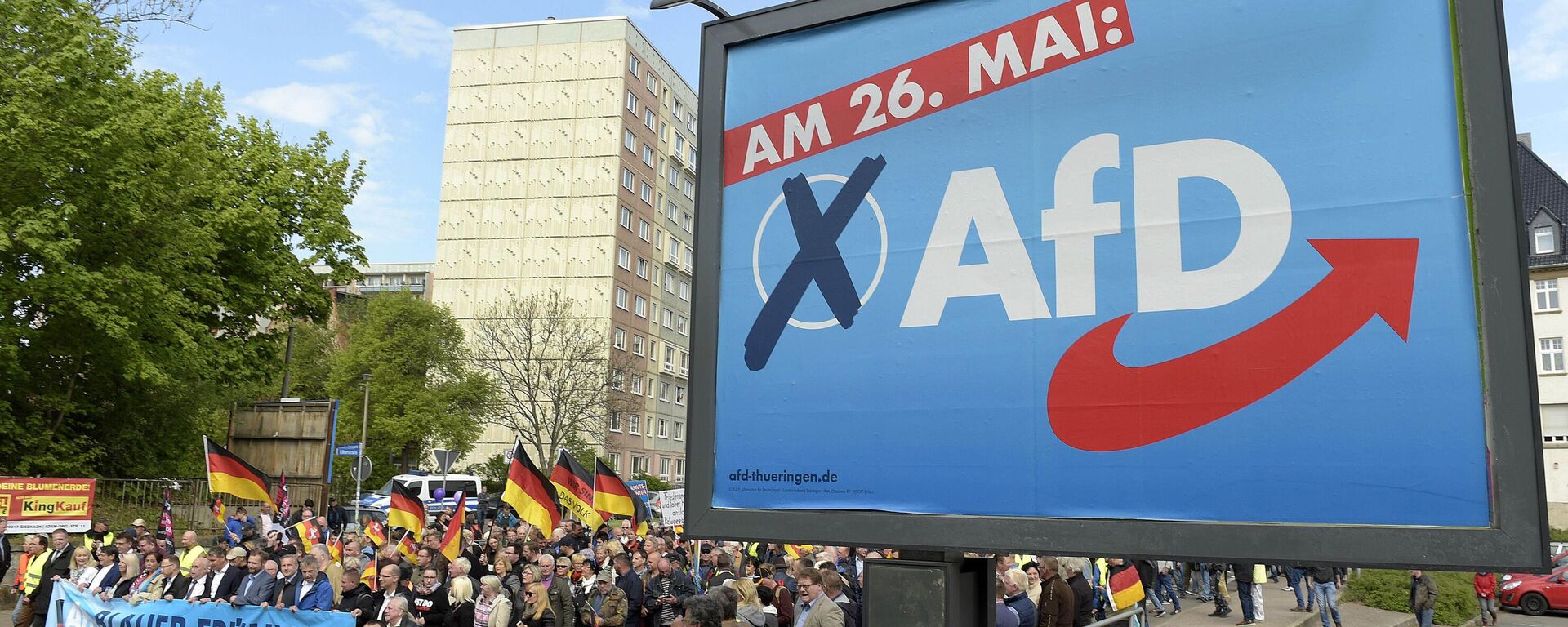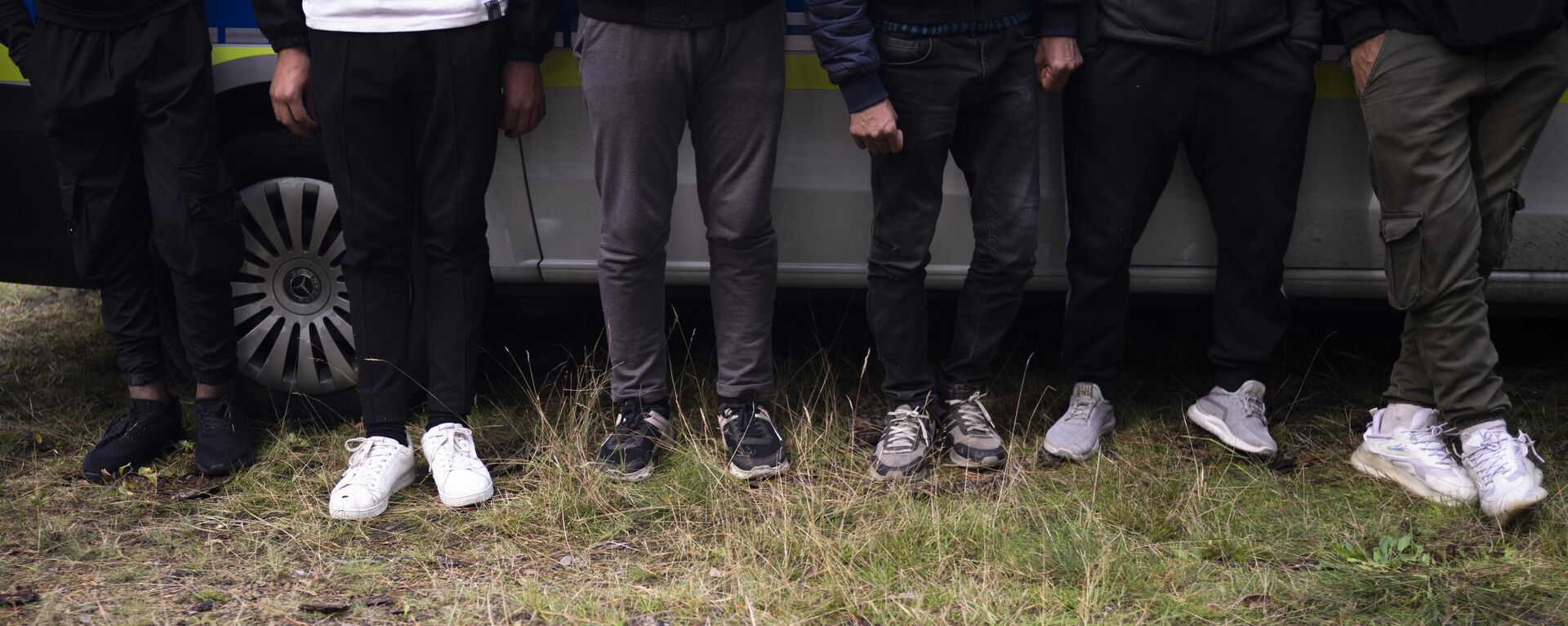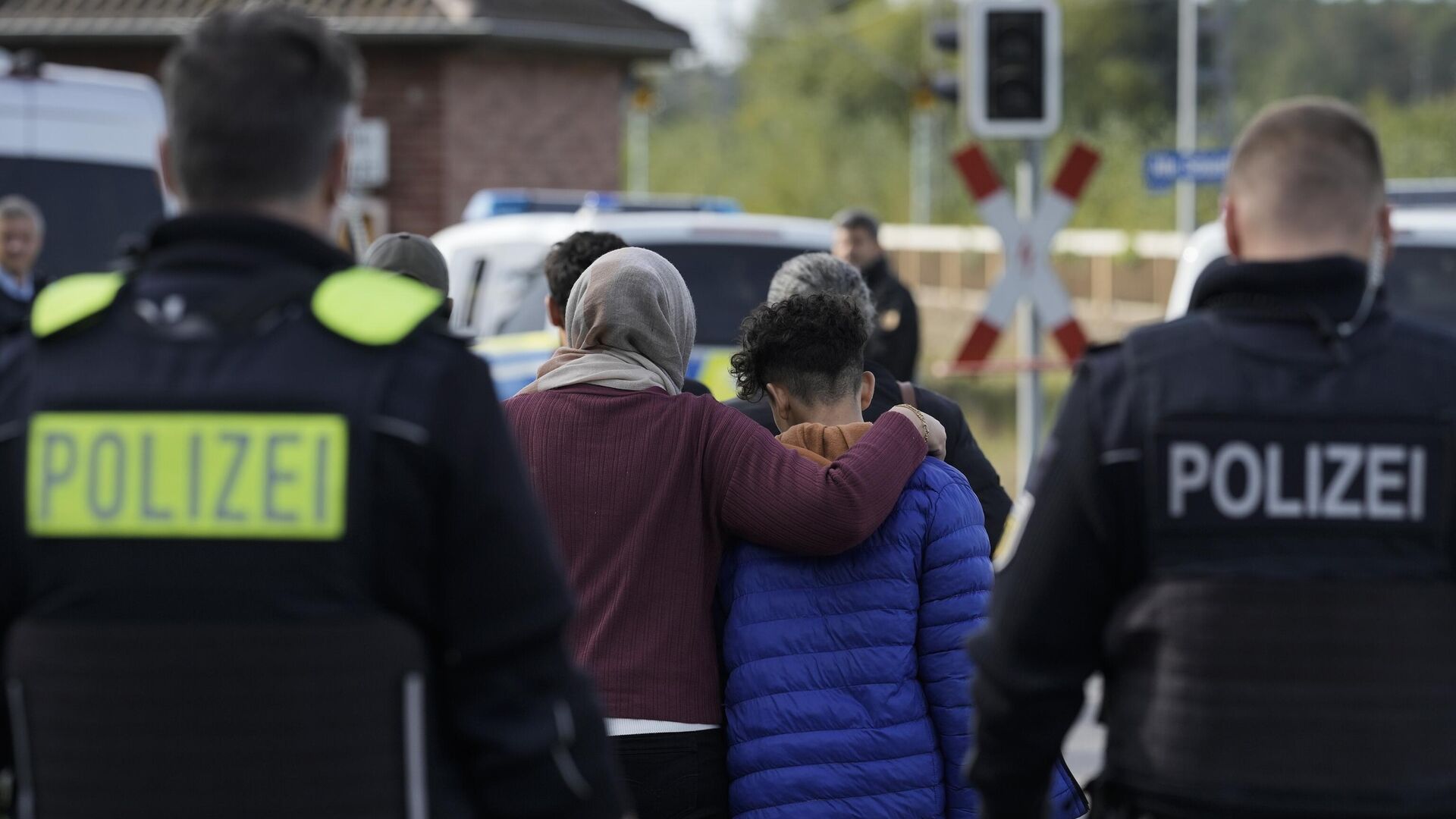https://sputnikglobe.com/20240911/germanys-new-border-crackdown-leaves-neighbors-dismayed--1120102725.html
Germany's New Border Crackdown Leaves Neighbors Dismayed
Germany's New Border Crackdown Leaves Neighbors Dismayed
Sputnik International
In the wake of a violent knife attack and elections which saw Germany's far-right party make electoral strides, the European country’s government has decided to impose temporary border restrictions.
2024-09-11T04:55+0000
2024-09-11T04:55+0000
2024-09-11T04:55+0000
analysis
europe
olaf scholz
george szamuely
european union (eu)
austria
france
germany
eu migrants
migration
https://cdn1.img.sputnikglobe.com/img/07e8/09/0b/1120104481_0:107:3072:1835_1920x0_80_0_0_263c208b5a6e498e7d18dc28dc2ddaf3.jpg
In the wake of a violent knife attack and elections which saw Germany's far-right party make electoral strides, the European country’s government has decided to impose temporary border restrictions which they hope will control irregular migration. Interior Minister Nancy Faeser announced such plans on Monday and said they would be put those policies into effect beginning on September 16.The interior minister added that police are to check whether or not an asylum seeker has already sought protection in another EU country, and that the policy will allow local authorities to directly turn away migrants at borders.Germany will tighten controls at all nine of its land borders which are typically open under the European Schengen zone. This will include borders that are shared with France, Luxembourg, the Netherlands, Belgium and Denmark, Al Jazeera reported. The new policy will also tighten border restrictions which are already in place for Austria, the Czech Republic, Poland and Switzerland.George Szamuely, an author and senior research fellow at the Global Policy Institute, joined The Final Countdown on Tuesday and analyzed the ongoing tensions at Germany’s borders.Germany’s right-wing party, the Alternative für Deutschland (AfD) received an unprecedented number of votes earlier this month, pushing the party to second place behind the conservative Christian Democratic Union party (CDU) in Saxony with 30.6% of the vote. And in Thuringia, the AfD won its first German regional election by almost 10 points with 32.8% of the vote, and was followed by the Christian Democratic Union (CDU) which secured 23.6% of the votes according to exit polls.Following this recent win by the far-right party, current polls show that the AfD’ success most likely won’t slow down. The BBC reported that the party could take a majority of the votes in Brandenburg state’s election - sharply followed by the Social Democratic Party of Germany (SPD) - which will occur in just a few weeks. Locals who spoke to the BBC complained about “senseless” war and “money for Ukraine” as an issue. The AfD, as well as the Sahra Wagenknecht Alliance (BSW), have called for an end to the shipment of weapons to Kiev.“I think it is too late, too little too late. I think there's an election coming up in Brandenburg. I think that's not this Sunday, but the Sunday afterwards. It's likely to be very bad again for the ruling coalition,” the senior research fellow responded.In September of 2015, former German Chancellor Angela Merkel made the decision to allow thousands of asylum seekers cross German borders after suspending the Dublin Regulation, a study published in the European Journal of Political Research, explains.The European Union (EU) regulation determined that the country responsible for processing asylum claims would be the first EU country that a migrant entered. Thereafter, between 2015 and 2017, Germany received about half of all asylum seeker claims across the EU, and received 1.1 million applicants in 2015 alone. The study, which was done in March, did not find the policy change to have a “pull-effect” on migrants that would signal an “open-door” policy to those who are not asylum seekers but do wish to migrate such as irregular migrants or humanitarian migrants.Polish Prime Minister Donald Tusk denounced Germany’s recent decision as “unacceptable”. And Joris Bengevoord, who is the mayor of Winterswijk and chairman of the Euregio group, called the decision a “panic reaction”, while Austria’s interior minister said they would not take in anyone who is turned away by Germany.
https://sputnikglobe.com/20240904/anxiety-within-germany-about-its-future-afd--bsw-take-east-germany-by-storm-1120004676.html
https://sputnikglobe.com/20240827/scholz-vows-increased-deportations-following-brutal-mass-stabbing--1119920754.html
austria
france
germany
Sputnik International
feedback@sputniknews.com
+74956456601
MIA „Rossiya Segodnya“
2024
News
en_EN
Sputnik International
feedback@sputniknews.com
+74956456601
MIA „Rossiya Segodnya“
Sputnik International
feedback@sputniknews.com
+74956456601
MIA „Rossiya Segodnya“
germany, border, eu, european union, elections, afd, immigration, migration, asylum seekers, immigrants in germany, migrants in germany, immigration in germany, illegal immigration, illegal migrantion, more migrants, more immigrants, accept migrants, accept immigrants, german economy, scholz government, deportation law, deportation measures
germany, border, eu, european union, elections, afd, immigration, migration, asylum seekers, immigrants in germany, migrants in germany, immigration in germany, illegal immigration, illegal migrantion, more migrants, more immigrants, accept migrants, accept immigrants, german economy, scholz government, deportation law, deportation measures
Germany's New Border Crackdown Leaves Neighbors Dismayed
German Chancellor Olaf Scholz vowed to strengthen deportation laws following a deadly mass stabbing in the western city of Solingen, during which a suspected Islamic extremist killed three people and injured eight others at a street festival. The suspect had his asylum application rejected, and was supposed to be deported from Germany last year.
In the wake of a violent knife attack and elections which saw Germany's far-right party make electoral strides, the European country’s government has decided to impose temporary border restrictions which they hope will control irregular migration. Interior Minister Nancy Faeser announced such plans on Monday and said they would be put those policies into effect beginning on September 16.
The interior minister added that police are to check whether or not an asylum seeker has already sought protection in another EU country, and that the policy will allow local authorities to directly turn away migrants at borders.
Germany will tighten controls at all nine of its land borders which are typically open under the European Schengen zone. This will include borders that are shared with France, Luxembourg, the Netherlands, Belgium and Denmark,
Al Jazeera reported. The new policy will also tighten border restrictions which are already in place for Austria, the Czech Republic, Poland and Switzerland.
George Szamuely, an author and senior research fellow at the Global Policy Institute, joined The Final Countdown on Tuesday and analyzed the ongoing tensions at Germany’s borders. “...this migrant problem is Europe-wide: France, Italy, and the UK. Germany is a particular case because, of course, Germany is the richest country in Europe. It also has one of the most generous welfare systems in Europe. So, all of the migrants that actually come into Europe tend to head towards Germany. And so, that's what Germany is trying to crack down on,” Szamuely explained.
“...the migrants who register for asylum in Bulgaria, however, using the Schengen system in Europe, then head towards Germany and then apply for welfare payments in Germany. And, this is really causing a great deal of consternation in Germany, not just because of the enormous burden on the German economy, but because of these scenes of violence,” he added.
Germany’s right-wing party, the Alternative für Deutschland (AfD) received an unprecedented number of votes earlier this month, pushing the party to second place behind the conservative Christian Democratic Union party (CDU) in Saxony with 30.6% of the vote. And in Thuringia, the AfD won its first German regional election by almost 10 points with 32.8% of the vote, and was followed by the Christian Democratic Union (CDU) which secured 23.6% of the votes according to exit polls.

4 September 2024, 00:57 GMT
Following this recent win by the far-right party, current polls show that the AfD’ success most likely won’t slow down. The BBC reported that the party could take a majority of the votes in Brandenburg state’s election - sharply followed by the Social Democratic Party of Germany (SPD) - which will occur in just a few weeks. Locals who spoke to the BBC complained about “senseless” war and “money for Ukraine” as an issue. The AfD, as well as the Sahra Wagenknecht Alliance (BSW), have called for an end to the shipment of weapons to Kiev. “I think it is too late, too little too late. I think there's an election coming up in Brandenburg. I think that's not this Sunday, but the Sunday afterwards. It's likely to be very bad again for the ruling coalition,” the senior research fellow responded.
“And Brandenburg is a particular embarrassment because it's the stronghold of Berlin, which, in turn, has always been historically the stronghold of the Social Democratic Party. So, even if they, Social Democrats, don't do as badly there, as they did in Thuringia and Saxony, it'll still be very embarrassing.”
“...this coalition government is obviously acting in desperation. They've got 12 months left before the federal elections, they're obviously going to lose the federal elections because the full standing is so terrible. So they're floundering around trying to do something at the margins, because it's going to be very difficult. Because, having allowed in so many migrants, it's going to be really problematic trying to move them out,” he added.
In September of 2015, former German Chancellor Angela Merkel made the decision to allow thousands of asylum seekers cross German borders after suspending the Dublin Regulation, a study published in the European Journal of Political Research, explains. The European Union (EU) regulation determined that the country responsible for processing asylum claims would be the first EU country that a migrant entered. Thereafter, between 2015 and 2017, Germany received about half of all asylum seeker claims across the EU, and received 1.1 million applicants in 2015 alone. The study, which was done in March, did not find the policy change to have a “pull-effect” on migrants that would signal an “open-door” policy to those who are not asylum seekers but do wish to migrate such as irregular migrants or humanitarian migrants.

27 August 2024, 06:05 GMT
Polish Prime Minister Donald Tusk denounced Germany’s recent decision as “unacceptable”. And Joris Bengevoord, who is the mayor of Winterswijk and chairman of the Euregio group, called the decision a “panic reaction”, while Austria’s interior minister said they would not take in anyone who is turned away by Germany. “...I think [there’s] a lot of disgruntlement towards Germany, among other EU states, which I think is now contributing to the resentment directed at Scholz, who is talking about expelling these asylum seekers, but essentially dumping them in other EU states. And they say, well, we don't want to take them,” said Szamuely. “I think Germany kind of let the side down by essentially opening the European doors in 2015.”




